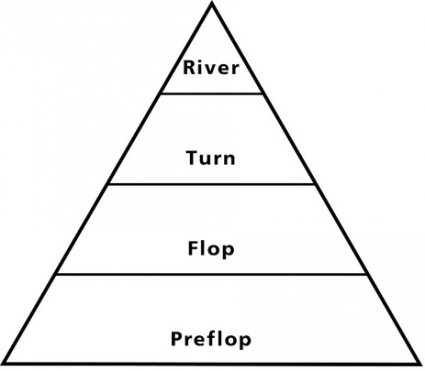This is the 22nd installment of my weekly poker column in the Economic Times, Range Rover.
Writers like watching other people – part of our job description is to understand human nature – and there are few better places to do that than at a poker table. We have captive subjects, sitting in one place for many hours at a time, subject to massive emotional swings, and mostly with their guard down except, once in a while, when they are in a big hand and try to be stoic and impenetrable. Watching a poker game is like watching a reality show, except that the participants don’t display the occasional self-consciousness that a camera might provoke.
One of the things that most fascinates me in long sessions is how people behave differently depending on their stack sizes. If they’re winning and stacked up, they tend to be talkative and cocky and in a generally merry mood. When they’re losing, they can be upset, irritable, silent, sometimes even angry. Although short-term swings in poker are largely determined by luck, winners can be arrogant and advise others on how to play hands, as if their immediate good fortune is related to their skills, and losers can be sullen, diffident and negative. Comically, all this can be inverted within seconds. You could have a 4000bb pot at the end of which the guy who was winning is suddenly stuck for the day, and the erstwhile loser has recovered and made a profit. And snap, their demeanour changes as well, and the arrogant prick from a few minutes ago is now sitting with his shoulders slumped and his lips pouted, and you almost want to ruffle his hair and give him a bone.
This is how it is in the real world as well, for the poker table is a microcosm of life. The psychologist Paul Piff from UC Berkeley recently gave a TEDx talk about a number of social experiments he and his colleagues carried out. In one, they got 100 participants in their lab to play a rigged game of monopoly. Players were randomly assigned the roles of ‘rich player’ and ‘poor player’, and the rich player got “two times as much money,” “twice the salary” when they passed Go, and “got to roll two dice instead of one.” As you’d expect, the rich players started crushing the poor ones, purely due to the luck of the draw at the start. And their behaviour changed.
In Piff’s words, “One person clearly has a lot more money than the other person, and yet, as the game unfolded, we saw very notable differences and dramatic differences begin to emerge between the two players. The rich player started to move around the board louder, literally smacking the board with their piece as he went around. We were more likely to see signs of dominance and nonverbal signs, displays of power and celebration among the rich players. […] One of the really interesting and dramatic patterns that we observed begin to emerge was that the rich players actually started to become ruder toward the other person, less and less sensitive to the plight of those poor, poor players, and more and more demonstrative of their material success.”
At the end of the game, when interviewed, these rich players “talked about what they’d done to buy those different properties and earn their success in the game, and they became far less attuned to all those different features of the situation, including that flip of a coin that had randomly gotten them into that privileged position in the first place.”
Déjà vu, some? This is exactly how people behave in the real world, allowing privilege to give them a sense of superiority and entitlement. The consummate poker professional is immune to this, and does not allow himself to be affected by temporary swings, whether they last a few hours or a few sessions. He is always in the moment, trying to simply do the right thing. This is how he gets the most out of poker. And this is how we can get the most out of life. Don’t let success get to your head or failure get you down. Keep calm and carry on.
* * *
For more of my poker columns, do check out the Range Rover archives.
